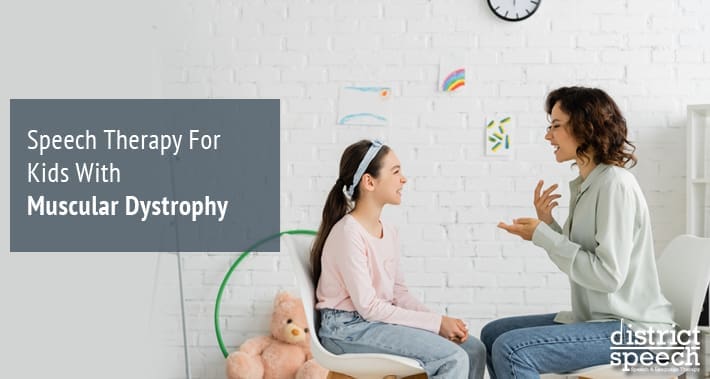
[ez-toc]
There are many challenges that kids with muscular dystrophy face.
Muscular dystrophy impacts muscle function.
This leads to a variety of movement and speech challenges.
Although muscular dystrophy is a degenerative disease, meaning that it will get worse over time, there are still steps you can take to help improve your child’s symptoms.
Pediatric speech therapy is a great option for supporting the speech and communication of children with muscular dystrophy.
If you are looking for a speech therapy clinic to help your child with muscular dystrophy, here is some information that will help you take the first step.
What Is Muscular Dystrophy?
Muscular dystrophy is a degenerative, congenital disorder.
It refers to a group of more than 30 genetic conditions that impact muscle function.
This means that a person with muscular dystrophy was born with the disorder and in general, symptoms will worsen over time.
Muscular dystrophy affects muscle tone and leads to muscle weakness.
Over time, this impacts the body’s ability to move effectively.
Depending on the type of muscular dystrophy your child has, it can impact their ability to learn to walk and acquire language.
It also means you may face challenges completing common daily activities like walking and eating.
Everyone experiences the development of symptoms at different rates.
Some people with muscular dystrophy experience symptoms as a baby, while others do not develop symptoms until adulthood.
The condition is relatively rare.
It’s normal to feel concerned and fearful when you find out your child has this condition.
But when you understand muscular dystrophy, the causes, and your child’s symptoms, there are steps you can take to improve symptoms and ensure they have the best quality of life possible.
What Causes Muscular Dystrophy?
Muscular dystrophy is caused by mutations in the genes that dictate muscle structure, function, and health.
This means that the cells responsible for maintaining your muscles are unable to perform this role.
As your cells struggle to maintain your muscles, you begin to experience muscle weakness that progressively worsens.
In most cases, a child with muscular dystrophy has inherited this genetic mutation from one or both of their biological parents.
There are three main ways to inherit muscular dystrophy:
- Recessive inheritance: This means that the condition comes from both of your biological parents
- Dominant inheritance: This means that the condition comes from one of your biological parents
- Sex-linked (X-linked) inheritance: This means there is a genetic mutation on the X chromosome
Typically, when it comes to an X-linked inheritance of muscular dystrophy, a genetically male person will have more severe symptoms since they only have one X chromosome.
Signs Of Muscular Dystrophy
The exact symptoms of muscular dystrophy that a child experiences will depend on the type of muscular dystrophy they have.
The main symptom is muscle weakness, but more specific muscle and movement symptoms may include:
- Muscle atrophy, which is the thinning of muscle mass
- Difficulty walking
- Difficulty running or climbing stairs
- Challenges with eating, swallowing, and speaking
- Irregular walking gait, such as waddling or toe walking
- Stiff or loose joints
- Tightening of muscles
- Tightening of tendons
- Tightening of skin
- Spasticity
- Muscle pain
There are also symptoms that are not directly tied to muscle movement, including things like:
- Fatigue
- Heart problems or heart failure
- Scoliosis (a curved spine)
- Issues breathing
- Intellectual or learning disabilities
Some people experience slowly worsening symptoms, while others experience the rapid progression of muscle weakness.
The pace at which symptoms will worsen depends on the type of muscular dystrophy you have.
How Does Muscular Dystrophy Affect Speech?
Since muscular dystrophy impacts muscles and can lead to learning and intellectual disabilities, this can also pose challenges for communication.
Those with muscular dystrophy may experience difficulties swallowing, speaking, eating, and drinking.
When your muscle function is compromised, it may become difficult to do everyday tasks like eating and communicating.
Muscular dystrophy also impacts muscles required for speech, such as the throat, tongue, cheeks, mouth, diaphragm, soft palate, and lip muscles.
This means that even speaking can be challenging for someone with muscular dystrophy, especially as your symptoms worsen.

How Can A Pediatric Speech Therapist For Muscular Dystrophy Help?
Because muscular dystrophy directly impacts speech muscles and communication, pediatric speech therapy is a great way to begin addressing these symptoms.
There are a range of ways that a speech therapist can help your child.
Working with a speech therapist means starting with an initial assessment.
Then, the speech therapist will craft a plan that is customized to your child’s specific strengths, needs, abilities, symptoms, and challenges.
The main aim of speech therapy for muscular dystrophy is to give your child new ways of dealing with the effects of muscular dystrophy that impact communication.
Although this will not stop or cure muscular dystrophy, it will equip your child with a wider range of skills to live with their condition.
Here’s how a speech therapist will help kids with muscle dystrophy.
1. If You Have Mild Speech Challenges
Children with mild speech challenges need speech therapy to improve the strength and endurance of their muscles.
Speech therapy for kids with mild speech challenges will include oro-motor exercises for speech muscles.
This means that a speech therapist will work with them on improving the strength and coordination of muscles, including:
- Throat
- Tongue
- Cheeks
- Mouth
- Diaphragm
- Soft palate
- Lip muscles
A speech therapist will also work with your child on articulation training.
Articulation training is meant for people with speech sound errors, which is a common challenge for children with muscular dystrophy.
Improving your articulation skills can include working on:
- Phonetic placement
- Exaggerating the articulation
- Talking slowly and clearly
- Taking breaths in between words
- Speaking in shorter utterances
Speech therapy for kids with mild speech challenges also includes voice training vowel prolongation.
This teaches your child how to increase the length of their vowel sounds in words.
It may consist of:
- Training for breath support
- Pharyngeal strengthening
- Holding your breath
- Coordination and respiratory muscle training that will improve breathing and talking
- Vocal hygiene
- Abdominal breathing training
- Pausing and talking
While these are some general ideas of what a speech therapist might do, the exact approach a speech therapist takes will depend on your child’s unique symptoms, abilities, challenges, and goals.
The benefit of working with a speech therapist is that your child will get care tailored to their unique situation that will help them better manage the implications of living with muscular dystrophy.
2. If You Have More Significant Speech Challenges
People with significant speech challenges may be difficult to understand.
This typically occurs in the later stages of muscular dystrophy.
At this point, working on muscle strengthening alone will not yield sufficient results as your muscles are now too weak.
Rather than focusing on speech muscles, a speech therapist will focus on alternative and augmentative communication.
This can include gestures and finger spelling to communicate.
If gestures are not an option due to limited hand functions, then symbol systems can be implemented.
For children whose primary issue is having a soft voice, they may begin to use devices like personal voice amplifiers and artificial phonation devices.
Book Your Appointment With District Speech Today
If your child has muscular dystrophy that is impacting their communication, speech therapy will equip them with new skills.
Ready to get started?
Book your appointment with District Speech today.
1300 I St NW, Suite 400 E,
Washington, DC 20005
- https://g.page/districtspeech
District Speech and Language Therapy specializes in speech therapy, physical therapy, and occupational therapy solutions, for both children and adults, in the Washington D.C and the Arlington Virginia areas.